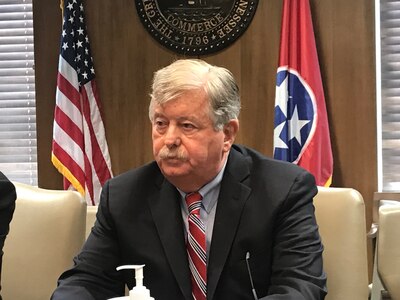Gov. Bill Lee’s fast-moving proposal to create a new kind of education voucher program slowed this week in Tennessee’s legislature over questions ranging from whether homeschoolers should be excluded to the immigration status of families wanting their children to participate.
The Senate was scheduled to take up the bill on Wednesday, but the measure that has barreled through three House panels was tabled for a week by Dolores Gresham, chairman of the Senate Education Committee.
A longtime champion of giving parents more education choices for their children, the Somerville Republican said that next Wednesday she’ll present another version of the bill that would still provide some families with taxpayer money to pay for private school or other private education services for their children.
“Doing some polling among my colleagues, I find that there is no real objection to the principle of parental choice; it’s just how we get there,” Gresham said. “And so we’re working to come up with a consensus on how we can get there.”
The pause is evidence of significant differences of opinion among lawmakers about Lee’s proposal to create education savings accounts, a form of vouchers. It allows supporters to tweak the legislation but also gives opponents time to rally their base against one of the most contentious issues before the Tennessee’s General Assembly. Meanwhile, the clock is ticking, with more hurdles to clear before votes could happen in the full House and Senate. Legislative leaders hope to wind down the session by early May.
Gresham acknowledged that she has her work cut out for her.
“There are as many issues as you find members of the Senate,” she said of the legislation as sponsors seek to secure 17 out of 33 votes in the Senate and 50 out of 99 in the House.
If history is any indication, the counts will be close. Except for a 2015 law creating a similar program for some students with disabilities, voucher legislation has never before passed both chambers of Tennessee’s legislature. Still, supporters are hopeful for a different outcome this year under a Republican supermajority with a new governor who won easily on a platform that includes “parent choice” on education.
High on Gresham’s to-do list is to address a House provision that requires families who apply for education savings accounts to provide government-issued documents like birth certificates, driver’s licenses, or passports.
The provision was added last week to get the bill through the House Education Committee, where several lawmakers did not want a new government program to benefit families without legal authorization to be in the country. However, the change appears to run afoul of a 1982 U.S. Supreme Court ruling that requires states to offer public education to all children, regardless of their immigration status.
“I believe federal law requires us to teach everybody,” Gresham said. “We don’t want to cross lines that we shouldn’t cross, so we’ll be careful … not to do that.”
Homeschooling is another area of disagreement. The House bill was amended so that homeschoolers could not receive education savings accounts — a nod to worries that the lure of receiving an average of $7,300 annually from the state could attract families who are not serious about homeschooling. Others worried that accepting the voucher would force serious homeschoolers to follow Tennessee’s academic standards and testing requirements.
Both Gresham and Senate Majority Leader Jack Johnson of Franklin were troubled by the omission.
“We’ll be looking at homeschoolers,” Gresham promised.
Fewer testing requirements for participants are raising eyebrows, too. The House bill requires students who receive education savings accounts to take state tests for math and English language arts but not for science, social studies, civics, and the ACT college entrance exam. That’s about half of the testing requirements for students in Tennessee public schools.
The differences are thorny ones, and each has the potential to derail the bill. Two years ago, concerns about imposing state testing requirements on private schools that accept vouchers stalled the last serious bill under consideration.
Lt. Gov. Randy McNally said he’s confident that the two chambers can forge a compromise.

“I think the bill will pass,” said the Oak Ridge Republican. “And there will probably be some changes that don’t actually mirror what the House has done, and we’ll work it out.”
A spokeswoman said the Republican governor was satisfied by this week’s legislative activity, including a positive recommendation on Monday from the House’s ruling-making committee and a visit at the state Capitol from U.S. Secretary of Education Betsy DeVos to discuss school choice legislation at both the federal and state levels.
“The administration is confident in this proposal and will continue to work with the legislature to ensure every child in Tennessee has access to a high-quality education,” said Laine Arnold, Lee’s press secretary, on Friday.
Sen. Raumesh Akbari, the only Democrat on the Senate Education Committee, is hopeful to see Gresham’s proposed changes well in advance of Wednesday’s meeting.
An attorney from Memphis, she said the provision that could affect whether immigrant students qualify could be challenged in court as it’s written in the House bill. “I think it needs to be thought through a little differently,” Akbari said. “I’m glad the Senate is slowing things down to think about the ramifications.”
She’s also concerned about the demographics of students who would be eligible. While the governor says the program aims to help low-income families whose students attend low-performing schools, a middle-class family of four making $65,000 annually could qualify. The governor’s original legislation set that threshold at almost $93,000 but, in one of several concessions to legislators, the administration lowered the amount.

“This is a massive, massive program to completely change how things occur in our education landscape. Our constituents deserve for us to take our time and look very closely at this bill,” said Akbari, who does not support vouchers or the current legislation.
Also next week, the proposal is scheduled for consideration Wednesday by the House finance subcommittee, where lawmakers will review the price tag for the program that could launch in 2021 with up to 5,000 students. It’s projected to cost as much as $125 million by 2024.
Rep. Brandon Ogles, a freshman legislator who serves on that panel, said he expects to vote to advance the bill to the full finance committee. “In finance and that subcommittee in particular, we’re not there to kill policy that slipped through other committees. We’re there to look at the funding aspect,” said Ogles, a Republican from Franklin.
You can follow the bill’s progression here.

